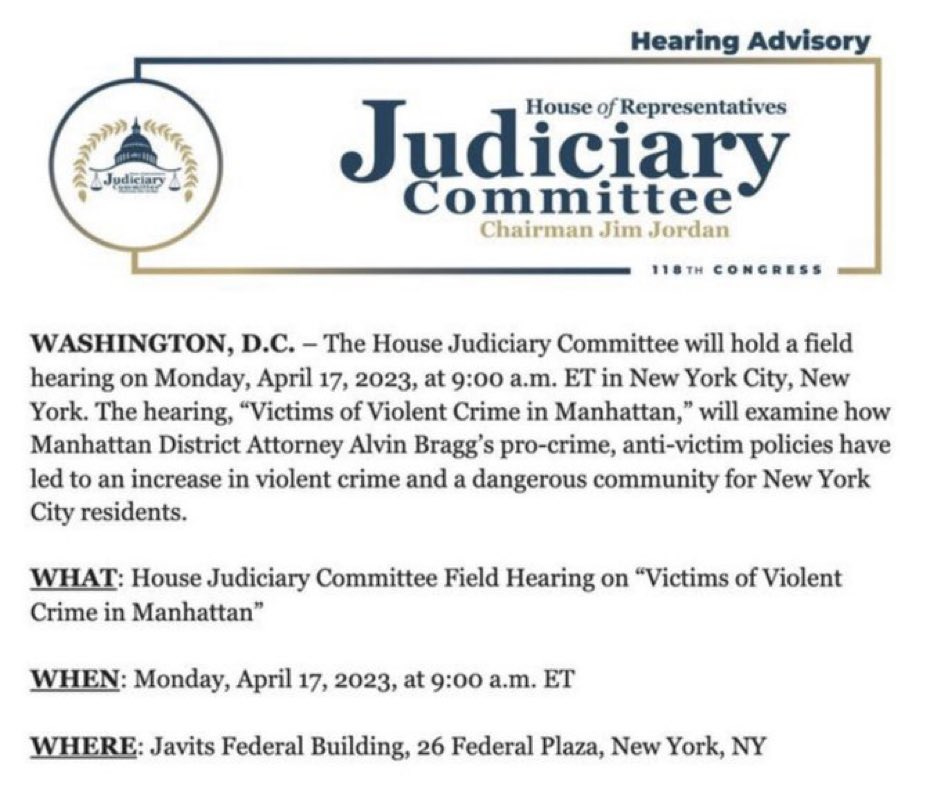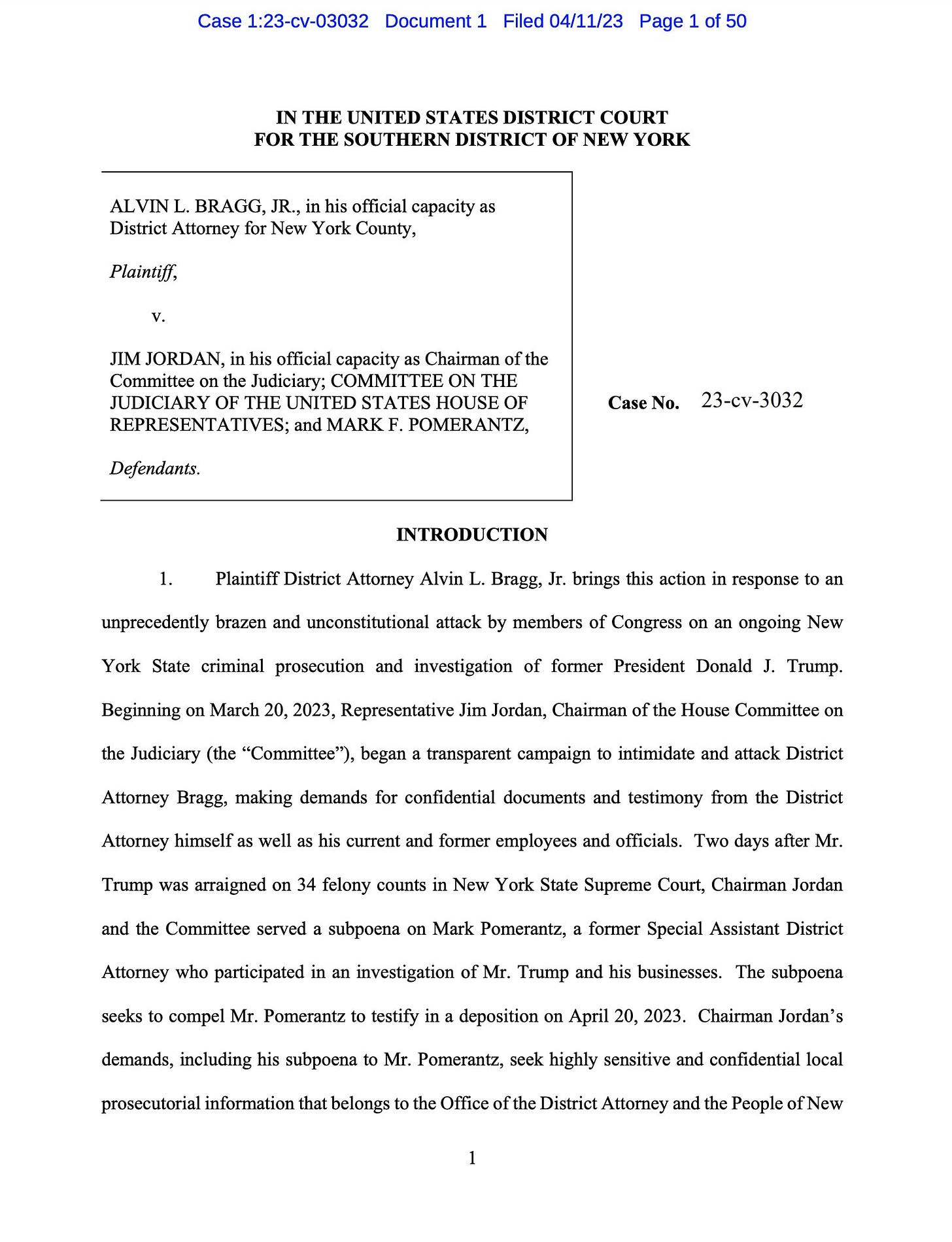
Last week, Ohio Republican Jim Jordan, chair of the House Judiciary Committee, decided to act tough and bring his show to Manhattan DA Alvin Bragg’s town.
Jordan also issued a subpoena to former assistant DA Mark Pomerantz, who made a public issue of his resignation when the newly elected Bragg passed on indicting Donald Trump on charges Pomerantz had been investigating. Those charges, which involved manipulation of property values for tax, insurance, and loan purposes, are not included in Bragg’s indictment. Pomerantz wrote a book and went on a speaking tour, and now, because of that, Jordan says he can’t ignore a Congressional subpoena (cc: Mike Pence).
Of course, the difference between Pomerantz and politicians who’ve written books or spoken extensively and then declined to comply with Congressional subpoenas is that Pomerantz was involved in a grand jury investigation. While he went further than some might have in his public conversations, he did not disclose grand jury proceedings—to do so violates the law. And, in any event, the charges Bragg has indicted on are different from the charges Pomerantz wrote about. While it’s possible there may be some legitimate scope of questioning Congress can put to Pomerantz, testimony regarding an ongoing case is off the table.
Today, Tuesday, Bragg punched back with a lawsuit filed in federal court in Manhattan. Bragg accuses the Judiciary Committee of using tactics that lack any legislative purpose. He wrote, “Chairman Jordan is not, however, free to unconstitutionally deploy Congress’s limited subpoena power for raw political retaliation, intimidation, or obstruction.”
Bragg filed his lawsuit in federal court because Congress is a party. Ironically, the issue could end up before the Supreme Court in this low-water-mark era in its reputation. While the Court may be willing to play fast and loose with ethics rules (no official comment has been forthcoming from the Chief Justice following ProPublica’s blockbuster story on Clarence Thomas’s hobnobbing with wealthy, powerful conservatives while traveling on billionaire Harlan Crowe’s nickel), we’re about to get an abject lesson in why the public’s confidence in the court matters when it issues a controversial opinion.
In federal court in Manhattan, Bragg asked for declaratory relief from the court. A declaratory judgment sorts out the rights of parties; it’s different from a civil suit for money damages. Here, Bragg asks the judge, in the face of what he alleges is an overreaching Congressional subpoena, for a declaration that the subpoena served on Pomerantz is “invalid, unconstitutional, ultra vires, and/or unenforceable” and requests a permanent injunction against its enforcement. Congress has broad latitude to issue subpoenas, as Democrats frequently argued during the Trump administration. So, Bragg has loaded his bases with possible mechanisms the court could use to invalidate the subpoena; he has also included Pomerantz, who previously told Jordan he would not testify voluntarily, as a defendant. Rather than suggesting animosity between the two, it suggests an awareness that the court may find Congress has broad latitude to issue subpoenas and nonetheless permanently enjoin Pomerantz from testifying because of the ongoing nature of the prosecution.
Bragg asked the judge to enter a temporary restraining order (TRO), an order that would immediately prevent enforcement of the Pomerantz subpoena, even before the judge can hear Jim Jordan’s side of the case. A TRO is a short-term, pre-trial temporary injunction, and the party asking for one must show they will suffer immediate, irreparable injury unless the order is issued. Where a judge is convinced a TRO is appropriate, they can issue it immediately, without holding a hearing. This type of order is meant to be a stopgap between filing the suit and the judge’s first opportunity to hold a hearing, but because TROs are so one-sided, many judges disfavor them, preferring to hold a hearing and then issue a preliminary injunction to preserve the parties’ positions while the litigation continues.
That appears to be how Judge Mary Kay Vyskocil will handle the situation. She promptly entered an order denying the TRO Bragg was requesting and setting a fast briefing schedule for considering whether to enter a preliminary injunction. She ordered Bragg to serve the lawsuit on the defendants by 9:00 p.m. tonight and gave the defendants until 9:00 a.m. on April 17, 2023, to respond, with a hearing to follow on April 19, 2023, at 2:00 p.m. Read the Court’s order here.
This is not a bad ruling for Bragg. As a practical matter, the subpoena is unlikely to be enforced in the interim, and he can always go back to the court if something comes up.
Judge Vyskocil, who is a Trump appointee, is highly regarded. She spent years in private practice with a large Manhattan law firm before becoming a bankruptcy judge and finally a federal district judge. Her background is impressive. She is not an Aileen Cannon or a Matthew Kacsmaryk.
In addition to the Pomerantz subpoena, Bragg asked the judge to enter a declaratory judgment that any additional subpoenas Jordan serves on Bragg himself, or on his current or former staff, are unenforceable. There was some suggestion shortly after the Pomerantz subpoena that Jordan issued a subpoena to Bragg’s senior counsel. Although there’s been no more mention of it in the press, Trump called the counsel out by name in a social media post. Whatever Jordan’s committee has planned, Bragg has made clear that he will strongly reject any Congressional interference in his office’s work.
The principle of hands-off of ongoing criminal investigations is well established. That makes sense. Congress passes laws; it has no power to prosecute. So, Jim Jordan doesn’t get to decide whether a criminal investigation can proceed; that would undo the separation of powers and, because Bragg’s is a state process, would interfere with important federalism principles that keep the federal government out of authorities reserved to the states—like state prosecutions. Imagine the damage if every member of Congress could interfere in a state prosecution of a local politician, or a big donor, or a family friend. There are reasons we have these rules, and Jim Jordan is putting them on full display.
Congressional investigators understand the need to stand aside when a federal case is in progress to avoid any interference. Because their job is oversight, it can wait until prosecutors’ work is complete. So, what’s going on here is unprecedented. Although Congress has broad investigative powers and Congressional subpoenas must be honored in the absence of a prior agreement between the committee and the witness or a determination in Court that a witness need not appear, Jordan is pushing the outer limits of that authority and looks to have crossed over it. And there is an important difference between Bragg’s approach and Jim Jordan’s when he ignored a subpoena issued by the January 6 committee. Bragg is going about it in the proper manner, consistent with the rule of law. Jordan did not.
You get a sense of Bragg’s tone from the first page of his 50-page pleading. All business and plain spoken about the need to protect a criminal case. Read the full complaint here.
The verdict may still be out in some people’s minds on whether the substance of Bragg’s case against Trump is solid. But when it comes down to process, Bragg has made it clear he’s got every intention of trying to stay a step ahead of Trump and his minions.
We’re in this together,
Joyce

















I was sitting in my car scrolling through my You Tube feed when I ran across the Meidas Touch(MTN)clip about DA Bragg’s 50 page response to that pissant Gym Jordan. If I could have danced in my car, I would have busted a move right then and there. Anyone who has sold Alvin Bragg short, I think will be singing a different tune before this is all over. Enough is enough. How Mr Bragg has had the patience to hold out this long is beyond me. It certainly is funny that republicans are all about “states rights” until they aren’t. It feels like we’re living in 1859 instead of 2023. Thanks Joyce for your informative post. I look forward to everything you write.
It's easy to feel outrage, but your calm, factual delineation of the facts brings me back to my senses. I always benefit from your grounded views. Your newsletter is a north star for me, recognizing the effort you put in to produce these missives so regularly.